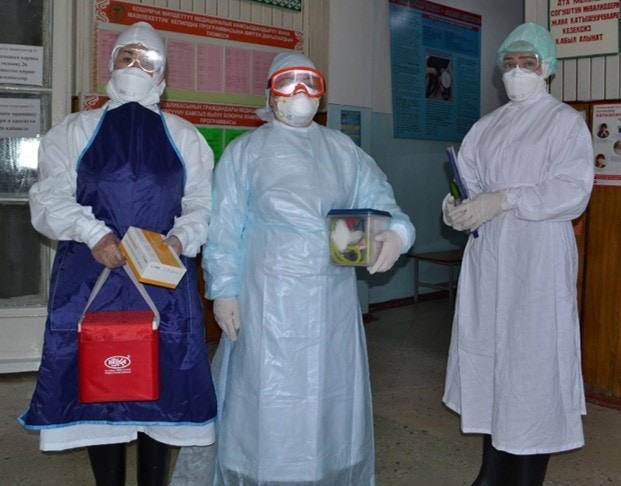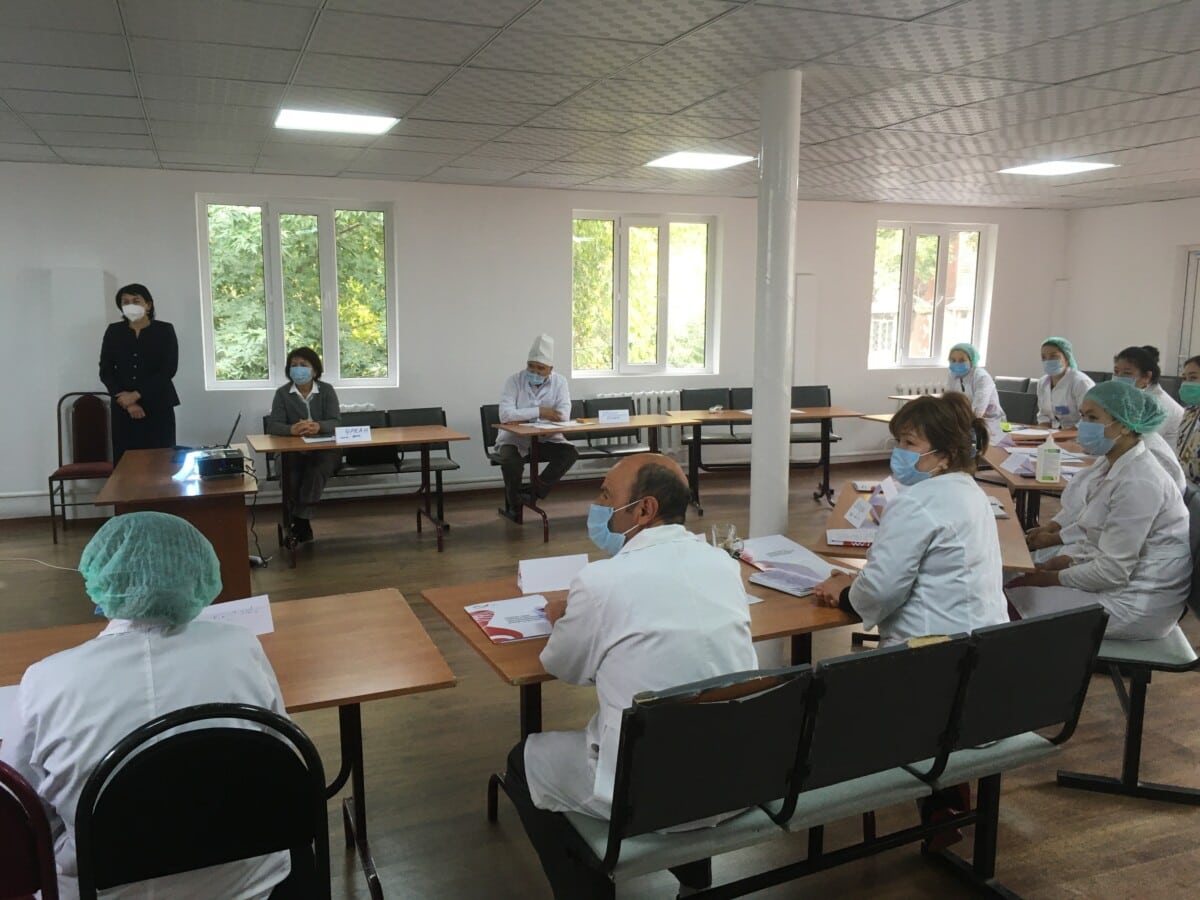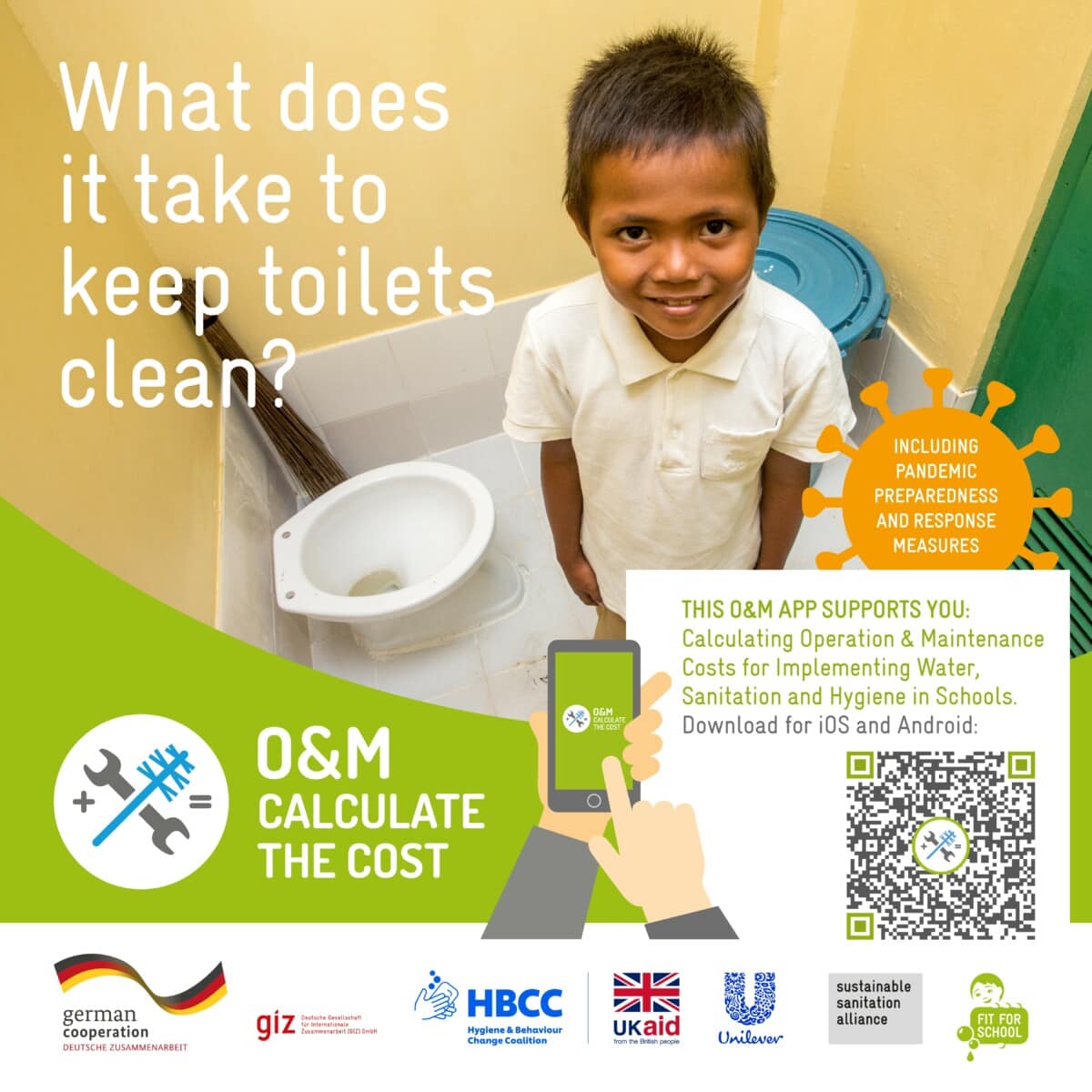Rapid support for primary health care centers in a time of great confusion
Healthcare workers in Kyrgyzstan were infected in large numbers during the early stages of the COVID-19 pandemic. With German support, Kyrgyz health facilities are placing new emphasis on water, sanitation, hygiene, waste management and cleaning to stem the spread of infections. This article, the first in a two-part series, focuses on primary health care centers in Osh.
Last April, as SARS-CoV-2 was spreading rapidly in southern Kyrgyzstan, doctors and nurses assigned to work in the brand new COVID-19 mobile ‘brigades’ had more questions than answers: What type of personal protective equipment (PPE) should they wear when making house calls to patients suspected to have COVID-19? Was it necessary to change PPEs between each call out? How should they safely transport the medical waste they generated? And did they need to disinfect the vehicles they were travelling in?
These were not idle concerns: by May 1st, according to statistics from the Ministry of Health, just over one-quarter of all COVID-19 infections in Kyrgyzstan had been registered among people working in healthcare facilities. Every time a doctor, nurse, midwife or driver for a mobile brigade was infected or sent into quarantine, it put further pressure on the colleagues still on the job. In this climate of fear and uncertainty, the main issue on healthcare workers’ minds was what they should do to protect themselves and their patients from infection.
Hygiene and health: Back to basics
The COVID-19 pandemic has refocused the world’s attention on the close link between hygiene and health. During an infectious disease outbreak, access to clean water, functional toilets, and handwashing facilities is essential for protecting human health.

The so-called WASH services – water, sanitation and hygiene, as well as waste management and environmental cleaning – are particularly important for limiting the spread of infections in health facilities. Ever since the adoption of the Sustainable Development Goals, and especially SDG 6 (ensure availability and sustainable management of water and sanitation for all), the need to improve WASH in health facilities has been rising on the international agenda. COVID-19 has added a new degree of urgency: according to October 2020 data from the World Health Organization, healthcare workers – who make up just 3% of the population – have accounted for 14% of all infections.
In order to protect themselves, their families, and the patients they care for, healthcare workers need access to basic WASH services. Unfortunately, many still do not have it: the 2020 Global Progress Report on WASH in Health Facilities found that one quarter of health facilities worldwide do not have basic water services and one tenth have no toilets. In Kyrgyzstan, according to the same report, only 70% of hospitals have an improved water source on the premises and only 44% of smaller health facilities have hand hygiene facilities available at points of care.
Rapid help for the pandemic ‘gatekeepers’ in Osh
Starting in May 2020, the Deutsche Gesellschaft für Internationale Zusammenarbeit (GIZ), working on behalf of Germany’s Federal Ministry for Economic Cooperation and Development (BMZ), provided rapid support to primary health centers and maternity hospitals in Kyrgyzstan to improve their infection prevention and control systems.

In the city of Osh and the surrounding region, staff at the 12 Family Medicine Centers were stretched close to breaking point. From one day to the next, three-person mobile brigades of doctors, public health officials and drivers had to be formed and deployed – in the absence of any operational guidelines – while other colleagues worked to keep essential health services going at the Centers themselves.
Primary health care is considered by the World Health Organization (WHO) to be fundamental to achieving Universal Health Coverage. In Kyrgyzstan, however, ‘the COVID crisis made clear that primary health facilities simply didn’t have the resources to perform the “gatekeeping” role that was expected of them,’ explains Valerie Broch-Alvarez, the team leader with the GIZ-implemented Promotion of Perinatal Health project. ‘There were so many challenges all at once, from shortages of PPEs to a lack of algorithms for sorting and managing patients.’ The project, which already had a close relationship with the Family Medicine Centers, saw a chance to provide practical help in the area of infection prevention and WASH.
Comprehensive training linked to customised improvement plans
A team of consultants carried out a systematic assessment of infection prevention and control systems at each of the 12 Family Medicine Centers, followed by three-day trainings at each facility. A total of 176 primary healthcare workers completed and received professional development credit for the trainings.

‘Our focus at the beginning was on protecting personnel from infection, but when we did the assessments, we found out that the issues were much broader,’ says Sardarbek Karimov, who led the work in Osh on behalf of GIZ. ‘Each facility was different. In some they knew handwashing rules, but didn’t follow them. In others there was only running water for a certain number hours per day. When we saw the detailed results, we decided to prepare a comprehensive training.’
Among the topics covered were the correct use of personal protective equipment, the fundamentals of hand hygiene, and the application of core infection control principles to the organisation of work processes. A group of staff in each facility identified simple improvements which could rapidly reduce the risk of infection, such as systematic patient screening and sorting, limiting numbers of patients in the facility, designating separate entrances and exits, and hanging up hand hygiene posters at every sink. The project also supported the procurement of an autoclave for each Family Medicine Center for use in sterilising instruments.
A follow-up monitoring visit, carried out several months after the initial assessment, showed noticeable improvements: on average, the 12 Family Medicine Centers met 62% of the assessed indicators, up from only 46% during the initial assessment.
A new app will help health facilities calculate required supplies
One of the major challenges facing health facilities in Osh and across Kyrgyzstan has been the procurement of protective equipment and other supplies to prevent infections. Because each health facility handles its own purchasing, the volume, type and quality of supplies vary widely. The Family Medicine Centers struggled with shortages of masks, robes, gloves, soap, disinfectants and other cleaning products at the start of the pandemic; nearly a year later, administrators still do not have a way to calculate the volume of supplies they need, and to ensure that orders are placed on time.

The Sustainable Sanitation Programme, a global initiative implemented by GIZ on behalf of BMZ, is exploring a solution that may make administrators’ jobs easier. It is supporting the adaptation of an app – originally designed to help schools calculate the operating and maintenance costs for water, sanitation and hygiene services – so that it can be used by primary health facilities. The ‘O&M – Calculate the Cost’ app, developed over the past three years by the Regional Fit for School Programme and the Sustainable Sanitation Programme, provides a simple, user-friendly way to determine how much water, soap, and cleaning products is needed by inputting basic information about the size of the school building, the water and sanitation infrastructure, and number of pupils and teachers. Since the start of the COVID-19 epidemic, the app has been reworked to include supplies for infection prevention and control, such as personal protective equipment and disinfectant.
‘The app is designed to help schools – and we hope someday primary health facilities – to calculate what they need to meet the basic service targets for SDG 6 on water and sanitation,’ explains Jan Schlenk, an advisor with the Sustainable Sanitation Programme. When a testing version of the app is available later this year, staff at the Family Medicine Centers in Osh Region will validate it and provide input into the redesign. ‘WASH infrastructure such as sinks and toilets are only useful if they are clean and functioning, and infection control protocols can only be followed if the necessary PPEs, cleaning supplies and disinfectants are available on time and in the right quantities.’
Technical and moral support during a difficult period
The initial months of the COVID-19 pandemic were tense and confusing. ‘We were insufficiently prepared,’ says Mr Abdilatip Shamshiev, the director of the Osh Family Medicine Centers. ‘Our medical staff didn’t know enough about how to manage COVID cases, and we didn’t have enough personal protective equipment or disinfectants.’ He sees now that the chance for the individual branches to evaluate their operations from the perspective of infection prevention was invaluable: ‘The cooperation has allowed us to believe in ourselves.’
‘Our support came during a very difficult period, and was not just technical, but also moral and psychological,’ observes Damira Seksenbaeva, an advisor with GIZ. ‘Real changes are now happening in all of the Family Medicine Centers. They have a great desire to keep improving and are no longer afraid.’
Karen Birdsall, January 2021

